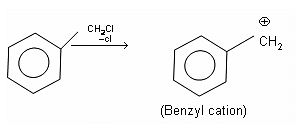NEET Exam > NEET Questions > Which of the following undergoes nucleophili...
Start Learning for Free
Which of the following undergoes nucleophilic substitution exclusively by SN1 mechanism?
- a)Ethyl chloride
- b)Isopropyl chloride
- c)Chlorobenzene
- d)Benzyl chloride
Correct answer is option 'D'. Can you explain this answer?
| FREE This question is part of | Download PDF Attempt this Test |
Most Upvoted Answer
Which of the following undergoes nucleophilic substitution exclusivel...
SN1 substitution proceeds through the formation of a carbocation intermediate and the preference for this mechanism depends on the stability of the carbocation formed.
The order of preference is as follows: benzyl > allyl > tertiary > primary > secondary > primary > alkyl halides.
Moreover, SN1 reaction is favoured over SN2 by heavy groups on the carbon atom attached to halogen due to steric hindrance.

Since benzyl carbocation is resonance stabilised, nucleophilic substitution of Benzyl chloride invariably proceeds through SN1.
Attention NEET Students!
To make sure you are not studying endlessly, EduRev has designed NEET study material, with Structured Courses, Videos, & Test Series. Plus get personalized analysis, doubt solving and improvement plans to achieve a great score in NEET.

|
Explore Courses for NEET exam
|

|
Similar NEET Doubts
Which of the following undergoes nucleophilic substitution exclusively by SN1 mechanism?a)Ethyl chlorideb)Isopropyl chloridec)Chlorobenzened)Benzyl chlorideCorrect answer is option 'D'. Can you explain this answer?
Question Description
Which of the following undergoes nucleophilic substitution exclusively by SN1 mechanism?a)Ethyl chlorideb)Isopropyl chloridec)Chlorobenzened)Benzyl chlorideCorrect answer is option 'D'. Can you explain this answer? for NEET 2024 is part of NEET preparation. The Question and answers have been prepared according to the NEET exam syllabus. Information about Which of the following undergoes nucleophilic substitution exclusively by SN1 mechanism?a)Ethyl chlorideb)Isopropyl chloridec)Chlorobenzened)Benzyl chlorideCorrect answer is option 'D'. Can you explain this answer? covers all topics & solutions for NEET 2024 Exam. Find important definitions, questions, meanings, examples, exercises and tests below for Which of the following undergoes nucleophilic substitution exclusively by SN1 mechanism?a)Ethyl chlorideb)Isopropyl chloridec)Chlorobenzened)Benzyl chlorideCorrect answer is option 'D'. Can you explain this answer?.
Which of the following undergoes nucleophilic substitution exclusively by SN1 mechanism?a)Ethyl chlorideb)Isopropyl chloridec)Chlorobenzened)Benzyl chlorideCorrect answer is option 'D'. Can you explain this answer? for NEET 2024 is part of NEET preparation. The Question and answers have been prepared according to the NEET exam syllabus. Information about Which of the following undergoes nucleophilic substitution exclusively by SN1 mechanism?a)Ethyl chlorideb)Isopropyl chloridec)Chlorobenzened)Benzyl chlorideCorrect answer is option 'D'. Can you explain this answer? covers all topics & solutions for NEET 2024 Exam. Find important definitions, questions, meanings, examples, exercises and tests below for Which of the following undergoes nucleophilic substitution exclusively by SN1 mechanism?a)Ethyl chlorideb)Isopropyl chloridec)Chlorobenzened)Benzyl chlorideCorrect answer is option 'D'. Can you explain this answer?.
Solutions for Which of the following undergoes nucleophilic substitution exclusively by SN1 mechanism?a)Ethyl chlorideb)Isopropyl chloridec)Chlorobenzened)Benzyl chlorideCorrect answer is option 'D'. Can you explain this answer? in English & in Hindi are available as part of our courses for NEET.
Download more important topics, notes, lectures and mock test series for NEET Exam by signing up for free.
Here you can find the meaning of Which of the following undergoes nucleophilic substitution exclusively by SN1 mechanism?a)Ethyl chlorideb)Isopropyl chloridec)Chlorobenzened)Benzyl chlorideCorrect answer is option 'D'. Can you explain this answer? defined & explained in the simplest way possible. Besides giving the explanation of
Which of the following undergoes nucleophilic substitution exclusively by SN1 mechanism?a)Ethyl chlorideb)Isopropyl chloridec)Chlorobenzened)Benzyl chlorideCorrect answer is option 'D'. Can you explain this answer?, a detailed solution for Which of the following undergoes nucleophilic substitution exclusively by SN1 mechanism?a)Ethyl chlorideb)Isopropyl chloridec)Chlorobenzened)Benzyl chlorideCorrect answer is option 'D'. Can you explain this answer? has been provided alongside types of Which of the following undergoes nucleophilic substitution exclusively by SN1 mechanism?a)Ethyl chlorideb)Isopropyl chloridec)Chlorobenzened)Benzyl chlorideCorrect answer is option 'D'. Can you explain this answer? theory, EduRev gives you an
ample number of questions to practice Which of the following undergoes nucleophilic substitution exclusively by SN1 mechanism?a)Ethyl chlorideb)Isopropyl chloridec)Chlorobenzened)Benzyl chlorideCorrect answer is option 'D'. Can you explain this answer? tests, examples and also practice NEET tests.

|
Explore Courses for NEET exam
|

|
Suggested Free Tests
Signup for Free!
Signup to see your scores go up within 7 days! Learn & Practice with 1000+ FREE Notes, Videos & Tests.
























